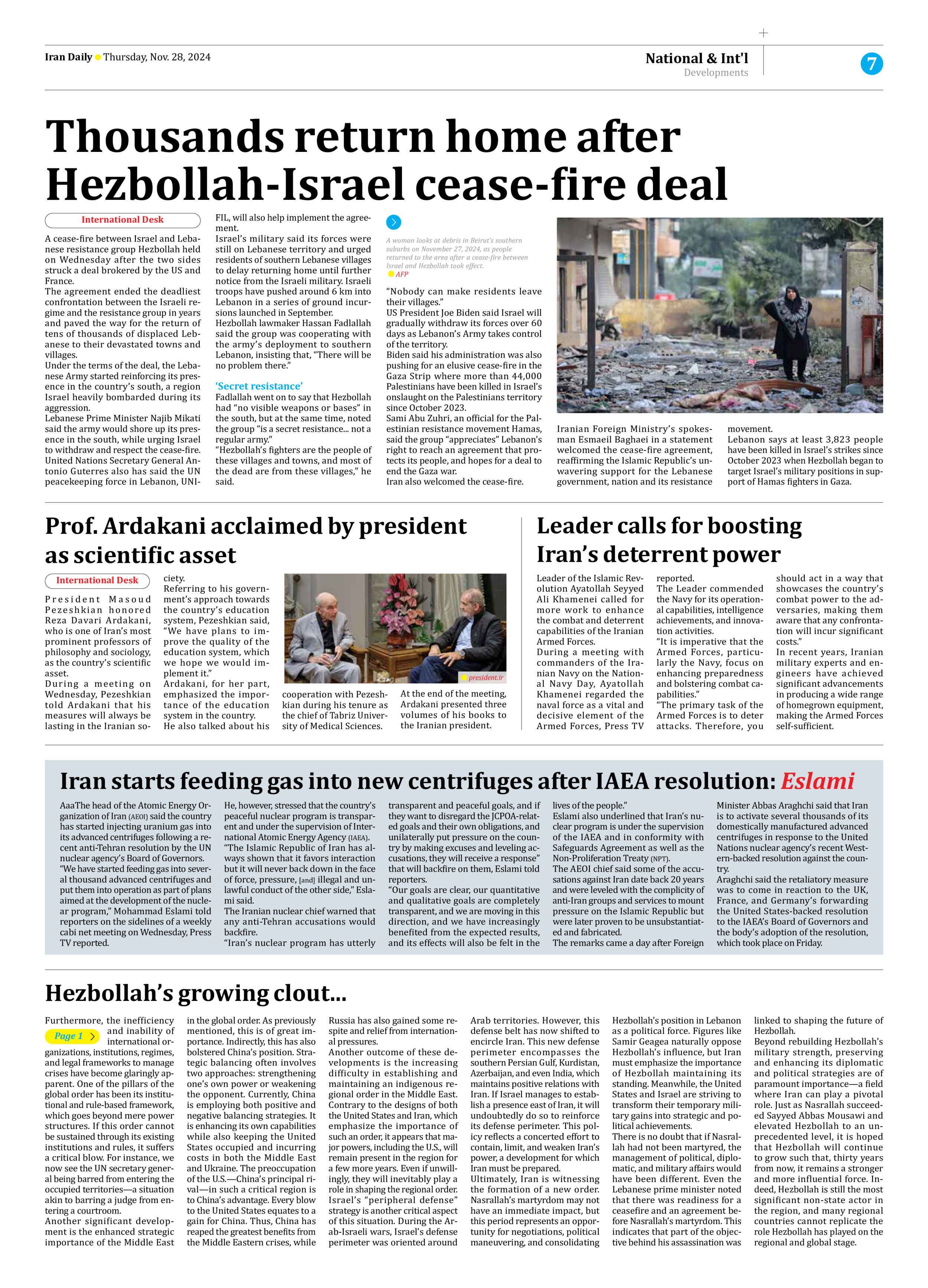
Hezbollah’s growing clout...
Page 1
Furthermore, the inefficiency and inability of international organizations, institutions, regimes, and legal frameworks to manage crises have become glaringly apparent. One of the pillars of the global order has been its institutional and rule-based framework, which goes beyond mere power structures. If this order cannot be sustained through its existing institutions and rules, it suffers a critical blow. For instance, we now see the UN secretary general being barred from entering the occupied territories—a situation akin to barring a judge from entering a courtroom.
Another significant development is the enhanced strategic importance of the Middle East in the global order. As previously mentioned, this is of great importance. Indirectly, this has also bolstered China’s position. Strategic balancing often involves two approaches: strengthening one’s own power or weakening the opponent. Currently, China is employing both positive and negative balancing strategies. It is enhancing its own capabilities while also keeping the United States occupied and incurring costs in both the Middle East and Ukraine. The preoccupation of the U.S.—China’s principal rival—in such a critical region is to China’s advantage. Every blow to the United States equates to a gain for China. Thus, China has reaped the greatest benefits from the Middle Eastern crises, while Russia has also gained some respite and relief from international pressures.
Another outcome of these developments is the increasing difficulty in establishing and maintaining an indigenous regional order in the Middle East. Contrary to the designs of both the United States and Iran, which emphasize the importance of such an order, it appears that major powers, including the U.S., will remain present in the region for a few more years. Even if unwillingly, they will inevitably play a role in shaping the regional order.
Israel’s “peripheral defense” strategy is another critical aspect of this situation. During the Arab-Israeli wars, Israel’s defense perimeter was oriented around Arab territories. However, this defense belt has now shifted to encircle Iran. This new defense perimeter encompasses the southern Persian Gulf, Kurdistan, Azerbaijan, and even India, which maintains positive relations with Iran. If Israel manages to establish a presence east of Iran, it will undoubtedly do so to reinforce its defense perimeter. This policy reflects a concerted effort to contain, limit, and weaken Iran’s power, a development for which Iran must be prepared.
Ultimately, Iran is witnessing the formation of a new order. Nasrallah’s martyrdom may not have an immediate impact, but this period represents an opportunity for negotiations, political maneuvering, and consolidating Hezbollah’s position in Lebanon as a political force. Figures like Samir Geagea naturally oppose Hezbollah’s influence, but Iran must emphasize the importance of Hezbollah maintaining its standing. Meanwhile, the United States and Israel are striving to transform their temporary military gains into strategic and political achievements.
There is no doubt that if Nasrallah had not been martyred, the management of political, diplomatic, and military affairs would have been different. Even the Lebanese prime minister noted that there was readiness for a ceasefire and an agreement before Nasrallah’s martyrdom. This indicates that part of the objective behind his assassination was linked to shaping the future of Hezbollah.
Beyond rebuilding Hezbollah’s military strength, preserving and enhancing its diplomatic and political strategies are of paramount importance—a field where Iran can play a pivotal role. Just as Nasrallah succeeded Sayyed Abbas Mousawi and elevated Hezbollah to an unprecedented level, it is hoped that Hezbollah will continue to grow such that, thirty years from now, it remains a stronger and more influential force. Indeed, Hezbollah is still the most significant non-state actor in the region, and many regional countries cannot replicate the role Hezbollah has played on the regional and global stage.







